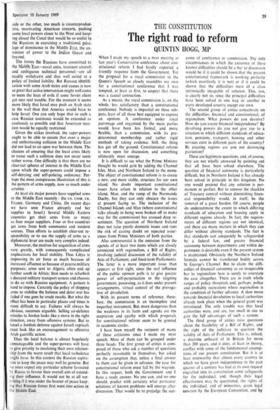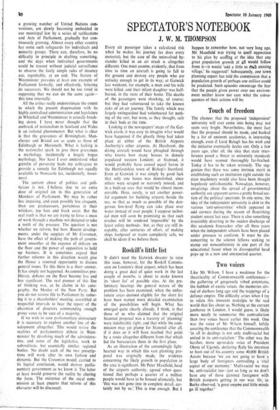The right road to reform
THE CONSTITUTION QUINTIN HOGG, MP
When I made my speech to a PEST meeting at last year's Conservative conference about con-
stitutional reform I had hardly expected a friendly response from the Government. Yet the proposal for a- royal commission in the Queen's Speech so closely resembles my own for a constitutional conference that I was tempted, at least at first, to suspect that there was a causal connection.
As a means, the royal commission is, on the whole, less satisfactory than a constitutional conference. Nobody is impartial on these sub- jects, least of all those best equipped to express an opinion. A conference under royal patronage and organised by the main parties would have been less formal, and more flexible, than a commission, with its pre- determined membership and rather rigid methods of taking evidence. Still, the thing has got off the ground. Constitutional reform is now open for discussion, and something ultimately must emerge.
It is difficult to see what the Prime Minister thought he would gain by adding the Channel Isles, Man, and Northern Ireland to the menu.
The object of constitutional reform is to create a new, and more viable, structure for our own island. No doubt important constitutional issues have arisen in relation to the other island, Man, and the rump of the Normandy Duchy, but they can only obscure the issues at present facing us. The inclusion of the Channel Islands and Man (where constitutional talks already in being were broken off to make - way for the commission) has aroused deep re- sentment. The question of Northern Ireland does not raise purely domestic issues and runs the risk -of casting doubt on repeated assur- ances from Prime Ministers of both parties.
Also controversial is the omission from the agenda of at least two items which are closely connected with regionalism, a Bill of Rights, involving judicial discussion of the validity of Acts of Parliament, and fixed-term Parliaments. The latter is a more important issue than appears at first sight, since the real influence of the public opinion polls is to give greater power of self-perpetuation to the reigning government, possessing, as it does under present arrangements, .virtual control of the preroga- tive of dissolution.
With its present terms of reference, there- fore, the commission is an incomplete and imperfect instrument. But, more dangerous than the weakness in its form and agenda are -the scepticism and apathy with which proposals for constitutional reform seem to be greeted in academic circles.
I have been myself the recipient of many of these criticisms since I made my PEST speech. Most of them can be grouped under three heads. The first group of critics is com- posed of those who ask a number of questions perfectly reasonable in themselves, but asked on the assumption that, unless a final answer to them can be given in advance, the case for constitutional reform must fall by the wayside. In this respect, both the Government and I have a ready answer. No one can, and no one should, predict with certainty what particular solutions of known problems will emerge after discussion. That would be to prejudge the out-
come of conference or commission. The only circumstances in which the existence of these known difficulties should be a bar to discussion would be if it could be shown that the present constitutional framework is working perfectly (which manifestly it is not) or if it could be shown that the difficulties were of a class intrinsically incapable of solution. This, too,
is clearly not so, since the principal difficulties have been solved in one way or another in every developed country except our own.
The second group of critics concentrate on the difficulties, financial and constitutional, of regionalism. What powers do you devolve?
How do you create financial independence? By devolving powers do you not give rise to a situation in which different standards of educa- tion, pensions, transport, housing and other services exist in different parts of the country? By creating regions are you not destroying patriotism?
These are legitimate questions, and, of course, they are not wholly answered by pointing out that all have been solved elsewhere. The question of financial autonomy is particularly difficult, but in Northern Ireland it has already been solved in principle in this kingdom. No one would pretend that any solution is per- manent or perfect. But to remove the shackles of Treasury control without diminishing finan- cial responsibility would, in itself, be the removal of a great burden. Of course, people do underestimate the extent to which differing standards of education and housing apply in different regions already. In fact, the require- ments of different regions are not identical, and there are many matters in which they can differ without altering standards. The fact is that standards can adequately be safeguarded by a federal law, and greater financial autonomy between departments and within de- partments is desirable even if the present system is maintained. Obviously the Northern Ireland formula cannot be transferred bodily across St George's Channel. But to claim the diffi- culties of financial autonomy as an insuperable bar 'to regionalism here is surely to overstate the case altogether. There are in truth whole ranges of policy (hospitals and, perhaps, police and probably recreation) where regionalism is the condition of further advance. A slow move towards financial devolution to local authorities already took place when the general grant was introduced. The only trouble was that local authorities were, and are, too small in size to gain the full advantages of such a system. The third group of critics raise questions about the feasibility of a Bill of Rights, and the right of the judiciary to question the validity of Acts of Parliament. This is, indeed, a doctrine unheard of in Britain for more than 200 years, and it does, at least in theory, conflict with some of the fundamental assump- tioni of our present constitution. But it is at least noteworthy that almost every country to which we have given independence in the past quarter of a century has had at its own request engrafted into its constitution some safeguards for the individual, and, though their legal effectiveness may be questioned, the rights of the individual, and of minorities, given legal sanction by the European Convention, and by a growing number of United Nations con- ventions, are slowly becoming embedded in our municipal law by a series of ratifications and Acts of Parliament, gradually but con- tinuously growing. Almost every other country has some such safeguards for individuals and minority groups. There can, therefore, be no difficulty in principle in drafting something, and the days when individual governments could be trusted without judicial surveillance to observe the fairly simple rules of decency are, regrettably, at an end. The Statute of Westminster provides at least one example of Parliament formally, and effectively, fettering its successors. We should not be too timid in supposing that we can do the same again:— this time internally.
All the critics really underestimate the extent to which the present dispensation with its highly centralised administration and legislature in Whitehall and. Westminster is actually break- ing down. I have never thought that the outbreak of nationalism in Scotland and Wales is an isolated phenomenon. But what is clear is that the grievances of Birmingham, Man- chester and Bristol are as acute as those of Edinburgh or Merioneth. What is lacking is the nationalist spark to give these grievances a mythology, incidentally a largely bogus mythology. Nor have I ever understood what grethlin of perversity leads my colleagues to provide a remedy for Edinburgh not equally available to Newcastle (or, incidentally, Inver- ness).
The current abuse of politics and poli- ticians is not, I believe, due to an extra dose of original sin in this generation of Members of Parliament. We may be rather less imposing, and even possibly less eloquent, than our predecessors, portentous in their whiskers, top hats and frock coats. But the real truth is that we are trying to force a mass of work through a machine not designed to take a tenth of the pressure. The question is not whether we reform, but how. Recent develop- ments, under the auspices of Mr Crossman, have the effect of making the path of govern- ment smoother at the expense of debates on the floor and the power of opposition to hold up business. It is sometimes argued that further reforms in this direction would give the House a renewed opportunity to discuss general issues. To this there is a short answer. It has simply not happened. As committees pro-
liferate, debates on the floor become less and less significant. The real pioneer of this line of thinking was, as he claims in his auto-
graphy, the Mosley of the New Party. But you do not restore life to Parliament by reduc- ing it to a shareholders' meeting, assembled at respectful intervals to hear the report of the chairman of directors commanding enough proxy votes to be sure of a majority.
If we wish to save parliamentary democracy it is necessary to explore another line of de- velopment altogether. This would revive the realities of parliamentary debate in West- minster by devolving much of the administra- tive, and some of the legislative, work to
subordinate, but essentially similar, regional bodies. No doubt each of the two prescrip- tions will work after its own fashion and dynamic. But the Crossman model, carried to
its logical conclusion, would destroy parlia- mentary government as we know it. The latter at least would preserve the reality by altering the form. The existence of the royal com- mission at least ensures that reform of this character will be discussed.



































 Previous page
Previous page